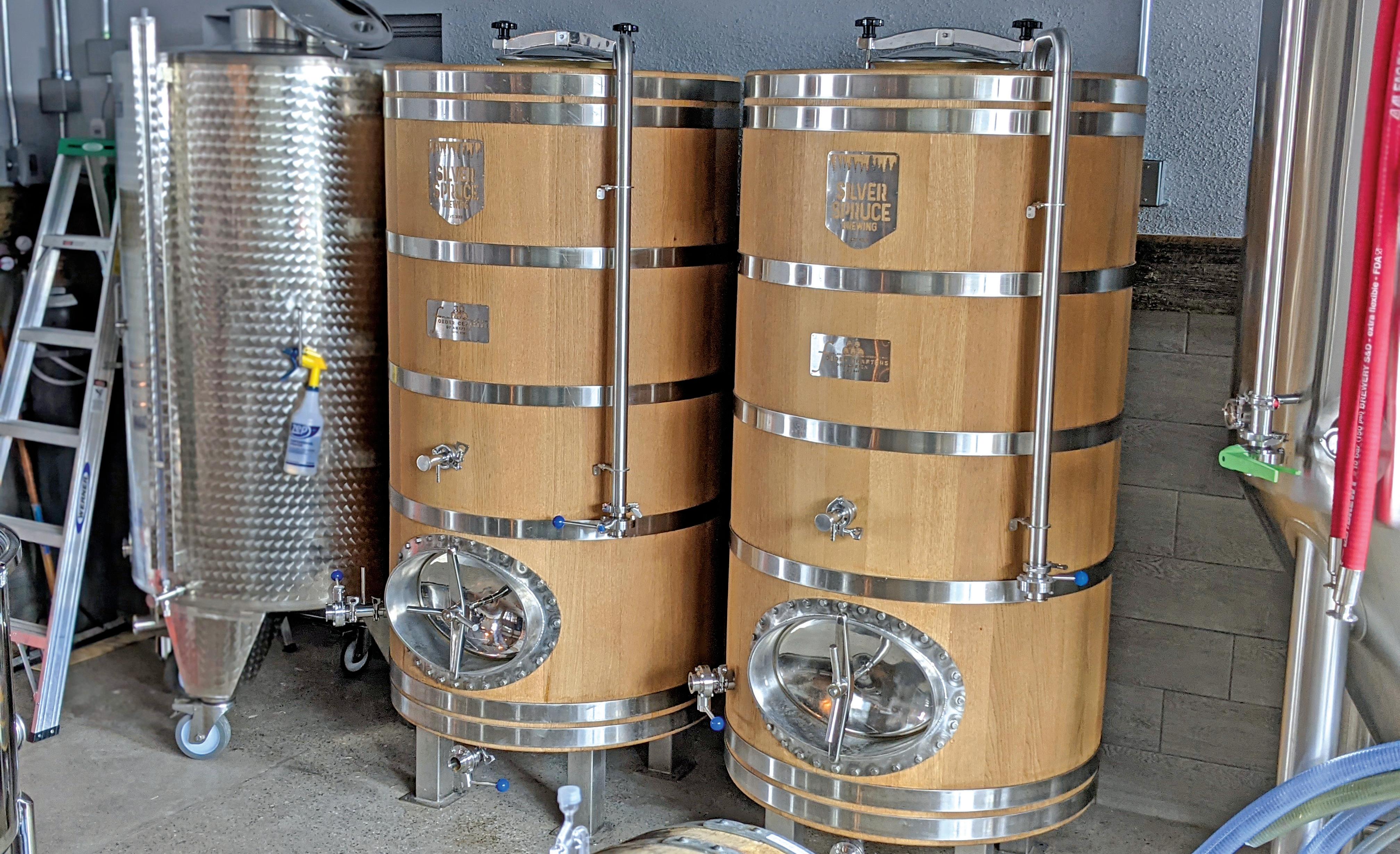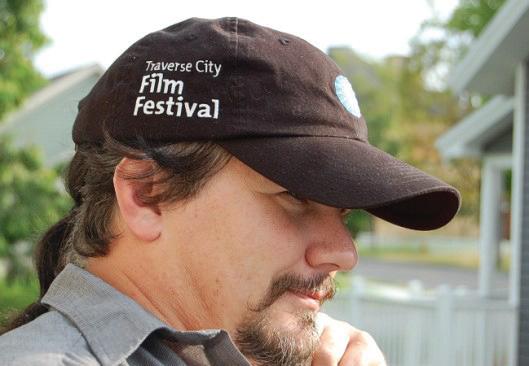
13 minute read
Getting Wild with the Foeder
Foeder (prounounced food-er) barrels, like Silver Spruces here, are typically about three times the size of an average oak barrel but can often be many times larger, allowing for more oxygen, slower aging, and a more nuanced but consistent beer — while taking up less space in a brewer’s floor.
By Karl Klockers
Drinkers with a discerning eye may have noticed a couple interesting-looking wooden containers in the back of Traverse City’s Silver Spruce Brewing. Behind a row of wine barrels sit two tall vertical barrels clad with stainless steel, huddled into a back corner. They’re called foeders, and at Silver Spruce they have one main job: taking your average beers and getting them to go wild.
Though aging beers in bourbon barrels seems almost a mandatory practice for craft breweries these days, and many area breweries will experiment with wine barrels from local vintners, true foeder-aged beer is much more of a rarity. What is a foeder, you ask? It is, in effect, a big, fancy barrel usually made from French oak, traditionally used by wineries and distilleries for aging their products.
And extra time in a foeder barrel adds many layers of flavors like oak, vanilla, leather, smoke, and caramel, as well as smoothes out the flavors of a beer or wine through time and oxidization. Unlike the second-use bourbon barrels that most breweries have access to, foeders are made for adding more delicate oaky flavors — Silver Spruce’s foeder is constructed from lightly-charred American oak — while simultaneously building a collection of fun yeasts, bacteria and other bugs that turn beer from mild to wild.
It’s taken a while to get the brewing program to this point, but it was always going to be part of Silver Spruce, according to owner/brewer Scott Stuhr.
“It was always in our plan to have some mixed-culture beers. It was never really something that we were going to do an insane amount of, but there’s not a lot of it [in the region].” When the brewery was able to expand and take over the entire building on Eighth Street, it gave them the freedom (and square footage) to go after these types of beers in earnest.
Few breweries have the patience, tools, and skills to bring a beer through a process like this, but it’s one that Stuhr is particularly prepared to undertake. Stuhr picked up some of this experience during his years amongst the thousand-plus barrels aging beers at Asheville Brewing Company, but his original training as a microbiologist and quality-control chemist really brings the scientific background needed to manage mixed-culture beers and wild yeasts.
Stuhr perks up when talking about things like lactobacillus and brettanomyces, as well as all the ways you can utilize these yeasts to impact flavors.” The magic really happens once that wort is cooled,” he said. “You have the whole opposite end of the [brewing] spectrum when making sour beer, where you’re purposefully not keeping it ‘clean.’”
This is not to say that sour beer is “dirty” — but the process of letting these wild yeasts slowly sour the beer is relative chaos as compared to the hyper-controlled fermentation processes of other beers, like Silver Spruce’s lagers, which is what you’ll most likely see Stuhr sipping at the end of a day. “I really enjoyed the process but for me it’s hard to beat a crisp, clean lager. I really, really enjoy making sour beer … I just don’t drink a ton of it.”
The first two foeder-aged beers to hit the tap lines are both currently pouring at their taproom. First is a rye farmhouse ale with Azacca hops that spent nearly a year resting on oak. It’s “more of a wild ale than sour,” as Stuhr described it, rich with tangy apricot and peach flavors brought forth by the mixed-culture fermentation.
In fact, there’s so much tropical flavor that it’s hard to believe that no actual fruit went into the beer — it’s pure chemistry and time that coaxed those flavors free. There’s a patina of kombucha-esque funk hovering over the brew that finishes nice and dry, inviting another taste.
The second is a delightfully tart cherry sour with a delicate sparkle of effervescence, well balanced between the naturally light fruity flavors brought out by the cherries and some sweet wisps of vanilla bouncing around the palate from the year it spent naturally souring in the foeder.
A good oak-aged sour “shouldn’t be tasting like you’re chewing on a piece of wood, but just that little bit of oak that kind of gives us some complexity,” Stuhr said. “The tannins in the wood can really balance the mouthfeel — it just gives it a whole different kind of feel.”
There’s no shortage of craft brews in Traverse City, even barrel-aged ones — but certainly very few built like these. Above all, simplicity and subtlety is key, from simple German-style Helles lagers to the wildest oak-aged sour ale: “I feel like killing people with simplicity is way more impressive than just bombarding something with an ingredient,” Stuhr said.



Mike Cummings Broker Owner/Realtor®
SRS - Sellers Representative Specialist SFR - Short Sale and Foreclosure Resource Certified RSPS - Resort & Second Home Property Specialist Webmaster, US Army Veteran, Licensed Builder Serving 6 + Northern Michigan Counties since 2002.
Mike@TCarea.comThe best part? These beers are only going Anytime to keep getting wilder. As each batch goes into and comes out of each foeder, they’re leaving behind a little bit of what makes each of them (231) 570-1111 unique. “It’s kind of a living breathing animal, If you need A Rockstar Real and that’s a big reason that we chose wooden vessels over stainless,” Stuhr said. Estate Agent to help with your “It’s almost like a sourdough culture, you know — you’ll use most of it, but you Real Estate never, you never really start a new one.” The technical term for that culture, so to speak, Next Home Adventures & is “solera,” and as time goes on, each foeder will progressively lose some of that oaky Listing Goes Here! challenges. Contact me - I want to be YOUR Guy! Dedicated Advocate to you Be a Land Baron! I have several 18 to 100 acre vacant parcels available. Starting $1,790/ac Such a busy market! All my current house listings are under contract or recently sold! Ideal Market Conditions for Sellers & Rising Values for Buyers character. But what it gains in wild yeasts and flavors is worth it. So what’s next for Silver Spruce’s sour program? Be prepared to be patient — these beers take time. While there are techniques to make a quicker sour beer, Silver Spruce is committed to the longer process required for true wild ales. In the meantime, look to the rows of beers resting in wine barrels that formerly held pinot grigio and other white vintages. Many of those are awaiting blending Further Studies in Foeder Beers Looking for other examples of foeder-aged beer in Northern Michigan? Frankfort’s Stormcloud Brewing also offers beer aged in foeders, one for “clean” Need a home or property evaluated? Contact me into a future cuvee of naturally soured brews. beers and one for their sour beer project, TCarea.com, LLC ™ 620 Second St, Suite B, Traverse City, MI 49684 Diligent - Honest - Informed - Full-time - Powerful Marketing anytime and I will fully assess the situation. Need some friendly advice & guidance given by a highly experienced & detail oriented Rockstar Agent? Call, email or text me anytime at 231-570-1111. “Sour beers are very difficult to get them to do exactly what you want them to do all the time, so blending is a huge part,” Stuhr said. It’s a lot like winemaking in that respect, in fact, where you find barrels that are very sweet, thin, heavy, tannic. “The blendability, I think, really gives you a lot of a lot of freedom really to kind of make a beer more like what you had in mind,” Stuhr said. Bringing wine blending techniques to craft beer in Traverse City? Sounds like a working Lakehouse Ales. The newest offering is a foeder-aged schwarzbier that spent over three months aging on oak to give it a gently woody profile to back up the roastier malts of the dark lager. Of course, Jolly Pumpkin has been a destination for wild and sour beers for years as well. While their Old Mission brewpub focuses on more straightforward craft beers, their packaged offerings recipe for some truly radical new brews. include their Hyrrokkin foeder-aged saison.



HAND-CRAFTED
ONLY AT YOUR NEIGHBOR HOOD BIG APP L E B A GELS®
1133 S. Airport Rd. W., Traverse City • (231) 929-9866
www.bigapplebagels.com WIFI
For Traverse City area news and events, visit TraverseTicker.com

Mike Cummings Broker Owner/Realtor®
SRS - Sellers Representative Specialist SFR - Short Sale and Foreclosure Resource Certified RSPS - Resort & Second Home Property Specialist Webmaster, US Army Veteran, Licensed Builder Serving 6 + Northern Michigan Counties since 2002.
Mike@TCarea.com
Anytime (231) 570-1111
If you need A Rockstar Real Estate Agent to help with your
Real Estate
Adventures & challenges.
Contact me - I want to be YOUR Guy!
Dedicated Advocate to you
Be a Land Baron! I have several 18 to 100 acre vacant parcels available. Starting $1,790/ac
Next Home Listing Goes Here!
Such a busy market! All my current house listings are under contract or
recently sold!
Need a home or property evaluated? Contact me anytime and I will fully assess the situation.
Call, email or text me anytime at 231-570-1111.
TCarea.com, LLC ™


Critical Discourse for the Living
Legendary radio hosts Diane Rehm and Cynthia Canty to talk death, dying, and deciding
By Anna Faller
Of all the topics we’d rather not talk about, death has long ranked near the top. The last on our list of cultural taboos, mortality still makes most Westerners squirm. After all, who really wants to discuss their own demise — or perhaps even worse, that of a loved one? Acclaimed radio host and author Diane Rehm does, and she wants her readers to talk about it, too. A longtime advocate for physician aid in dying, Rehm maintains that death is discourse for the living.
In her autobiography, “When My Time Comes,” Rehm fully examines the rightto-die movement as a step in the door of essential conversation. “We’re all going to go someday,” she says, “so, why not talk about how we’d like to go?”
Northern Express spoke to Rehm ahead of her upcoming virtual appearance with the National Writers Series in Traverse City, 7pm Feb. 25, in which she’ll discuss her book and the big questions about death, choice, and end-of-life care with Michigan journalist Cynthia Canty. Readers and thinkers from anywhere are invited to stream the free event, though registration is required to watch. (See sidebar for more information.)
FROM DOC TO BOOK
Based on the upcoming PBS documentary of the same name, “When My Time Comes” was conceived as a companion to the film. “The interest [in medical aid in dying] began, certainly on my part, in speaking out,” said Rehm. “About one year into the documentary, it occurred to me that I really wanted to write the book.” The book combines Rehm’s own encounters with 25 interviews conducted in all corners of the country with both terminally ill patients and experts in the field. The result? A complete exploration of personal choice and patient autonomy in end-of-life care.
Rehm herself is no stranger to death. “My mother died when she was only 49 years old,” said. “She had liver cancer, and she was in such horrible pain, she begged to die. Then my father, who was 62, died just 11 months later of a broken heart.”
Of course, medical aid in dying as we know it today didn’t exist when Rehm’s parents passed, in the mid-1950s.
But it did exist in 2014, when Rehm’s first husband, the late John Rehm, requested assistance in ending his life after a nearly decade-long battle with Parkinson’s disease. His nursing home, however, was located in Maryland, a state which didn’t — and still doesn’t — have a right-to-die law in place. “His doctor said that the only thing that [he] could do was stop eating, stop drinking, and stop taking any medication,” said Rehm. “I know many people choose this as a route out, but it was so hard to watch, and it was so, so hard on him. It took him 10 long days to die. I don’t want that suffering for anyone.”
BUT WHO DECIDES?
Of course, how to ease one’s suffering, particularly in terms of end-of-life care, is both subjective and highly divisive. But Rehm refuses to take sides. “Do we want God to be the only decider? If that’s the case, I support you, 100 percent,” she said. “If you want to have every single thing that medical science can offer, I support you, 100 percent.” She is, however, asking readers to reciprocate allowing each individual to make their own choice. “If you feel as I do, or maybe even if you don’t feel as I do, I hope you will respect and understand my wishes.”
Still, she contends, we can’t respect our loved ones’ wishes — nor can others respect our own — if we don’t know what those wishes are. “We need to tell those nearest and dearest to us what it is we want at the end of life,” said Rehm. “And it’s not one conversation — it’s many conversations.”
But how do we normalize such a contentious topic? “I think it’s not without discomfort,” said Rehm. “You open the door a little bit, and you walk through very gently. At another time, you raise the issue again. Eventually, you find out what that person wants, and you may be able to more clearly define what it is that you want.”
As for Rehm herself, make no mistake: When her time comes, she’ll depart on her own terms. “[My husband] knows what I want, my children know what I want, my friends know what I want, and my doctor knows what I want,” she says. “I do not want to be hooked up to any tubes or ventilators. I want to die right here, in my own home, in my own bed, with my children and my husband beside me.” READ, REGISTER, WATCH
Acclaimed radio host and author, Diane Rehm, will join the National Writers Series for a free, virtual event at 7pm Thursday, Feb. 25, to discuss the paperback release of her book, “When My Time Comes.” The book is available for preorder at Horizon Books with a 20% NWS discount. Guest host for the event is Cynthia Canty, an Emmy Awardwinning radio and television journalist, and former host of Michigan Radio’s “Stateside.” Registration can be found here: https:// nationalwritersseries.org/2021-springseason-registration/.
THE INTERVIEWER: CYNTHIA CANTY A lifetime resident of metro Detroit, Cynthia Canty was the host of Michigan Radio’s daily talk show “Stateside” from its inception in 2012 to her 2019 retirement. A veteran Detroit media personality, Canty has appeared on Southeastern Michigan radio and television since 1979. Since then, she’s served as a successful radio host, reporter, and producer. Canty was a news anchor alongside Jim Harper at WNIC-100.3 FM and held multiple roles at WKBD-TV throughout the 1990s. Canty’s numerous awards include an Emmy Award and honors from the Michigan Association of Broadcasters and the Detroit Press Club.



